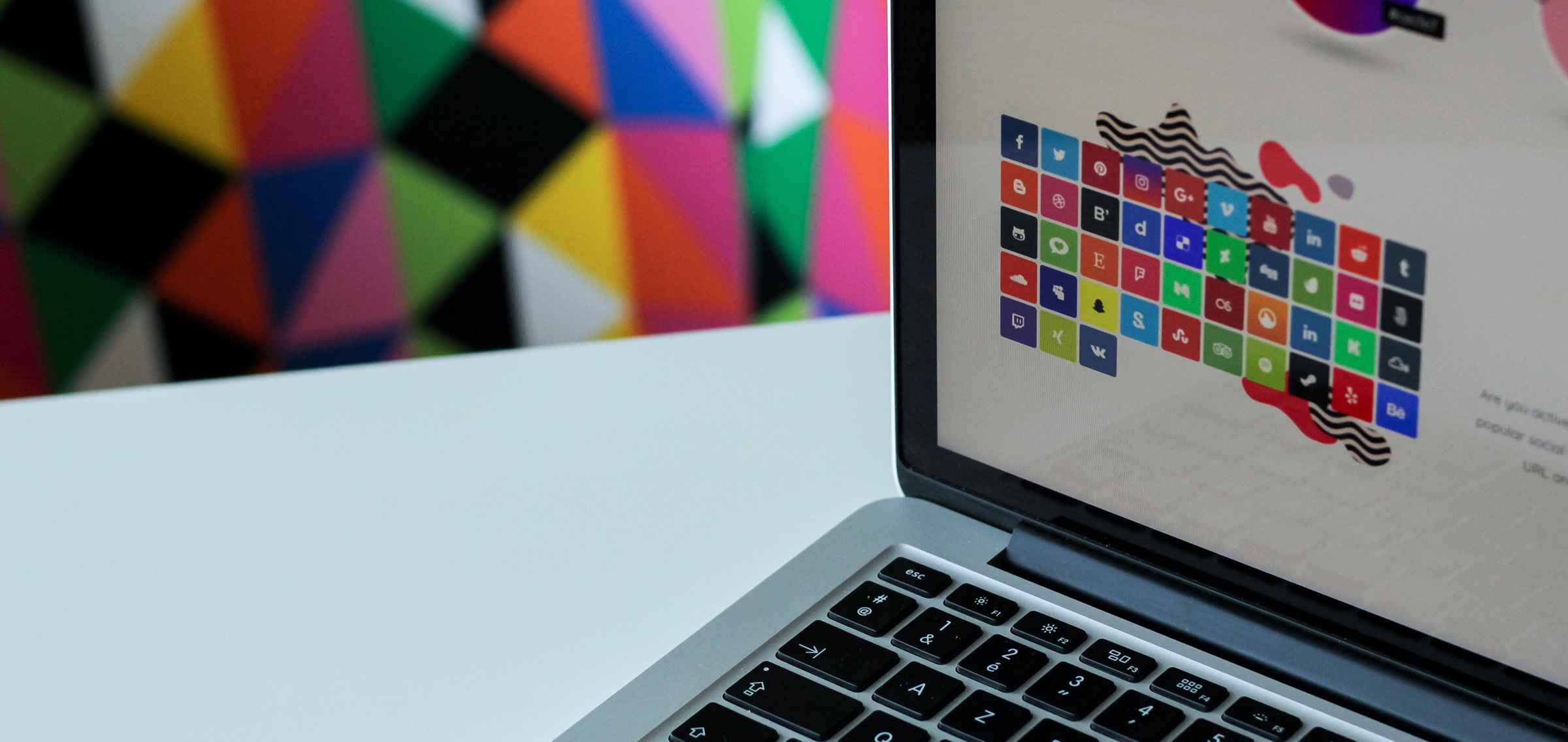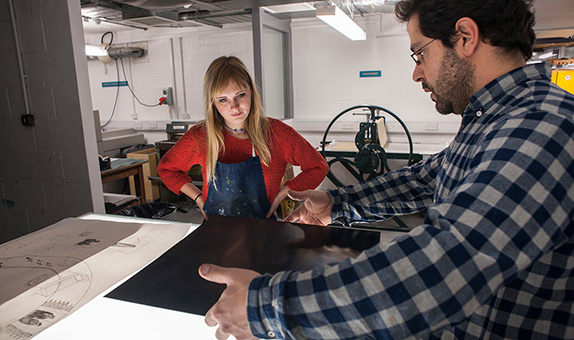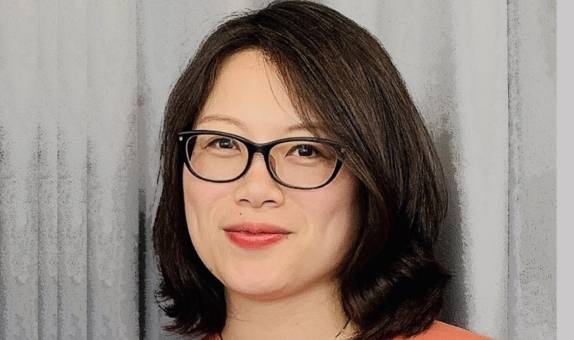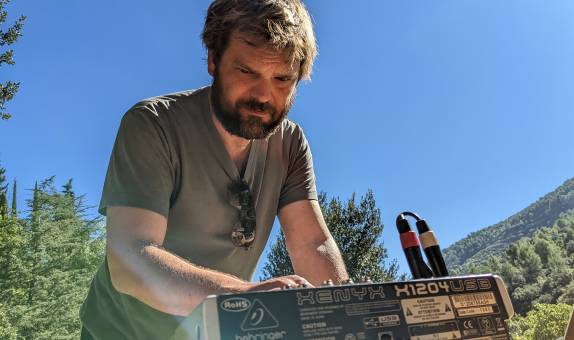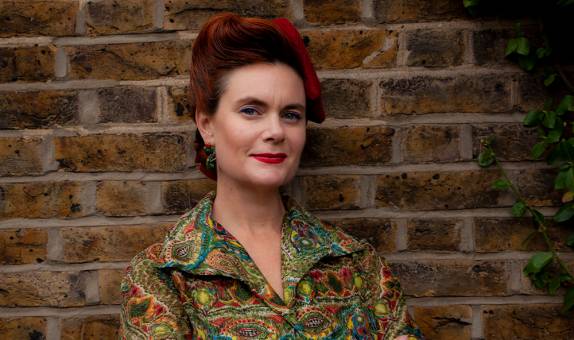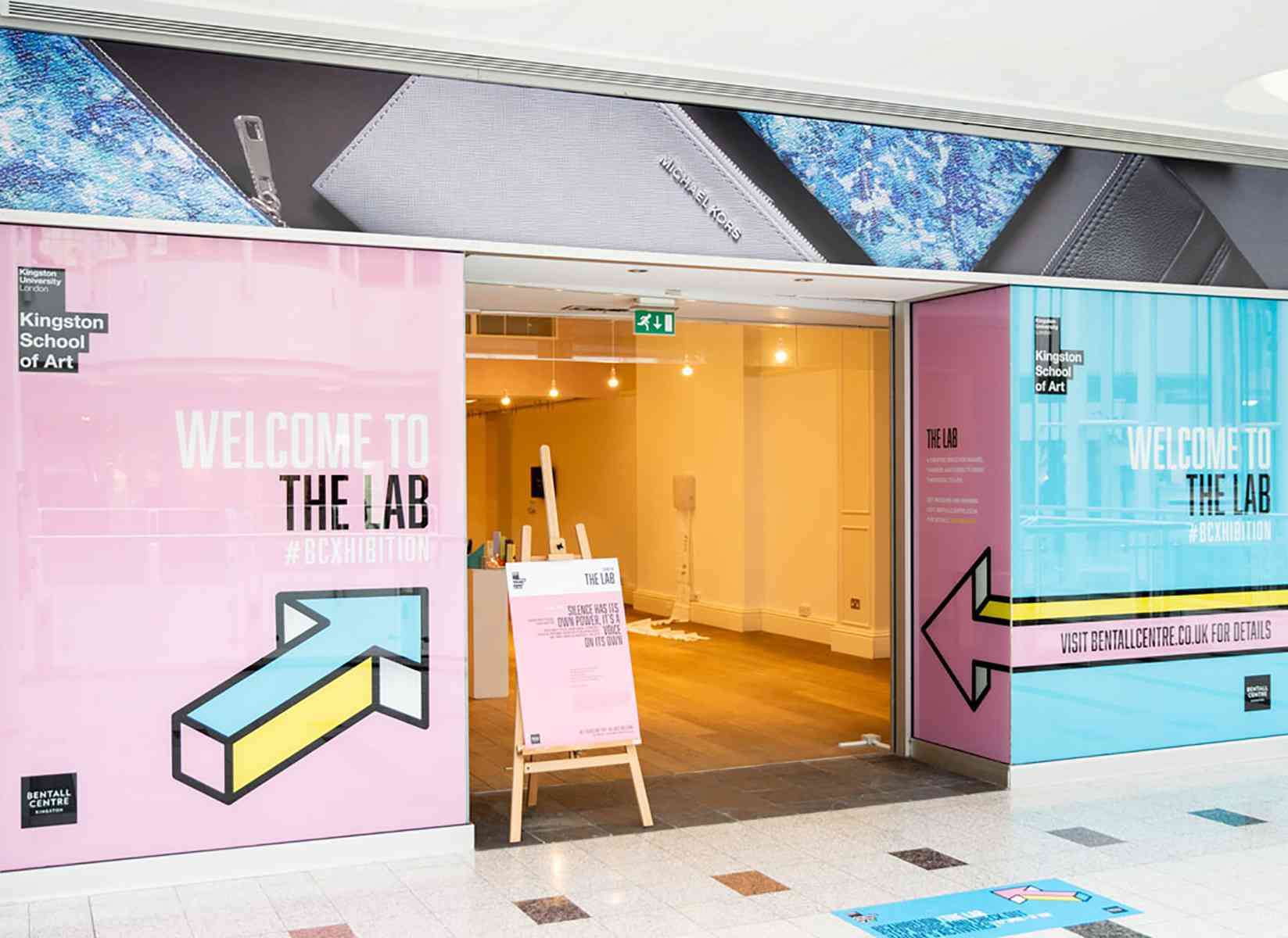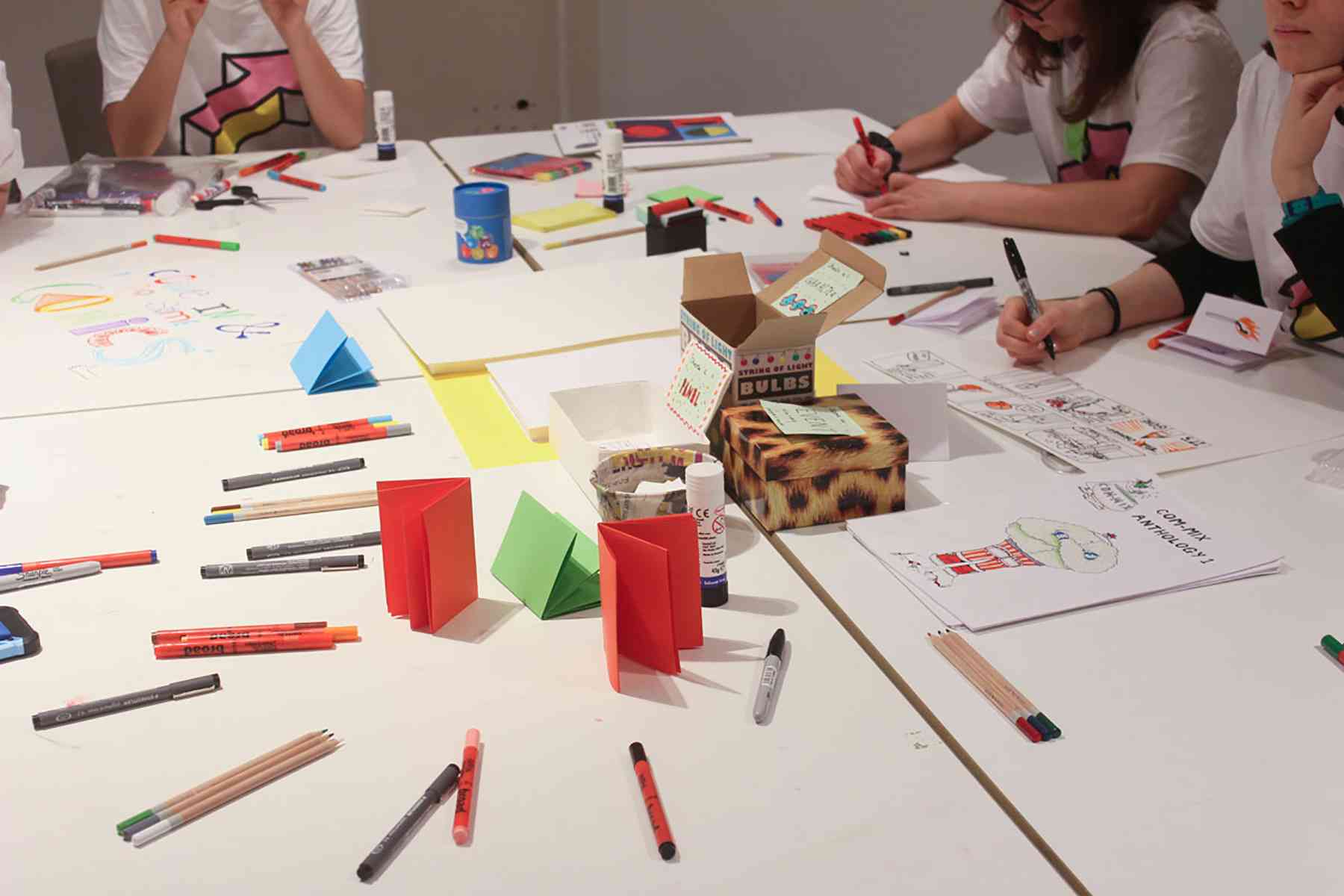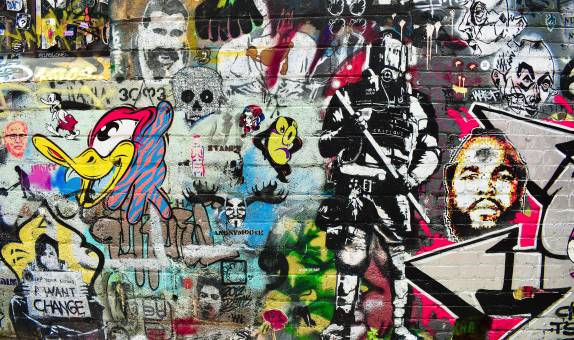Creative and Cultural Industries: Design Marketing BA (Hons)

Teaching Excellence Framework (TEF) Gold award
Our commitment to high quality teaching has been recognised with a TEF Gold rating. The University has received an overall rating of Gold, as well as securing a Gold award in the framework's two new student experience and student outcomes categories.
Why choose this course?
This course prepares you for a career in design marketing in the creative industries. You will develop the practical and analytical skills needed to create marketing materials and design user experiences across different media and digital environments.
You will learn to visualise, collaborate, experiment and project manage as you work on real-world projects with other students and industry professionals. You will also develop your knowledge of the creative industries, exploring topics such as design thinking, branding and strategy for creative organisations. You will have creative freedom and be encouraged to undertake non-commercial creative projects.
The Design Marketing BA (Hons) course also offers opportunities to work on live projects with creative companies and institutions, alongside your classmates in the student-powered creative agency, Studio KT1.
Throughout the course you'll also develop the commercial and organisational skills and understanding needed to work effectively in the Creative and Cultural sector.
For examples of what our students are up to on the course, check out our Insta.
| Attendance | UCAS code/apply | Year of entry |
|---|---|---|
| 3 years full time | P992 | 2024 (Clearing) 2025 |
Please note: Teaching on this course may take place on more than one KU campus.
| Main Location | Kingston School of Art, Knights Park |
Reasons to choose Kingston
- Kingston University was ranked No. 2 in London and Top 10 in the UK for Media & Film Studies in the Guardian University Guide 2024.
- You'll exhibit your own work, in inspiring creative spaces both on and off-campus.
- By joining our creative agency, StudioKT1.com, you'll gain experience by working on paid live briefs with a variety of organisations such as Kingston First and Veolia. You'll pitch and present your ideas to a variety of brands, studios and agencies.
- Thinking Through Making is the ethos of Kingston School of Art. You'll be able to experiment and learn in our world-class 3D workshops, digital media labs, film, photography and printmaking facilities.
The Art School Experience
As part of Kingston School of Art, students on this course benefit from joining a creative community where collaborative working and critical practice are encouraged.
Our workshops and studios are open to all disciplines, enabling students and staff to work together, share ideas and explore multi-disciplinary making.

An introduction to the course
What you will study
The Design Marketing degree develops design marketing skills and judgement. You will learn how to deliver the visual aspects of an organisation or client's marketing communications and gain project management knowledge through a combination of in-house and live briefs you will discover your creative self and your future role in industry.
Year 1
Year 2
Optional Year
Year 3
Year 1 is common to all our creative and cultural industries courses. You will explore visual communication techniques, use of design software, storytelling and design thinking. You will learn individually and as part of a team of creative partners and professionals. You will examine the management and strategy of creative enterprises, and the history and development of art and design practice.
Core modules
Creative Journeys
30 credits
This module builds the skills and understanding needed to create and deliver effective visual and verbal communications. Students will be introduced to theories on perception and communication and will apply them to the analysis of persuasive visuals used in visual communications. Students are simultaneously introduced to a fundamental set of conceptual and practical tools.
Practical project tasks will give students the opportunity to develop or enhance their industry standard software skills, supported by our technicians. Through the creation of visual concepts, video narratives, content creation for social and experimentation with emerging platforms, students will explain the possible visual identities of an event, campaign, or product. Students will learn to examine and redefine problems through close observation and investigate the use of empathy with users. User experience, interface design and prototyping are used to enhance the quality of communication and the explanation and sharing of ideas.
A basic understanding of image creation, editing and outputting via industry standard software students, supported by technicians in the Digital Media Workstation. Emphasis is not placed on the technical execution of visual outcomes (layout, designs, social media content, posters) but on the relevance to the brief, effectiveness and originality. Students will be encouraged to select appropriate media to support their visual stories so they could use a range of 2D/3D work (graphic, video, photo, illustration) or VR (Virtual Reality), AR (Augmented Reality), XR (Mixed Reality) and other immersive and emerging technologies depending on the skill and interests of the student.
Navigating Industry
30 credits
This module will introduce you to Future Skills through engagement with Navigate. It will enable you to begin to develop your professional identity and global citizenship, by promoting your understanding of ethical issues and values, design thinking, and commercial awareness. These concepts and associated activities will support you to plan your own personal and professional development, as a means of developing your creative practice. This will be supported through active engagement with Navigate, and through personal development planning (supported by Personal Tutors), which will enable you to reflect upon your Future Skills graduate attributes. It will also enable you to reflect on and begin to evidence your understanding of the skills you are developing holistically; through all the work you are creating as part of your course.
You will learn to write in professional contexts (writing to industry figures via email or LinkedIn messaging), creating your own profile on networking sites. The module will focus on writing in number of professional contexts and you will practise using a range of techniques and strategies to produce professional documents.
Through the creation of a Podcast you will explore industry sectors and roles and issues around Equality, Diversity and Inclusion and begin engaging with industry figures and bodies, learn how to interview, record and create engaging audio stories and begin to define your own place in the Creative Industries.
Thinking about ideas
30 credits
This module enables students to create a critical, historical, ethical and theoretical framework within which to investigate and understand practices of creativity in relation to art, design and culture.
The module explores the connections between creativity and social and cultural change by focusing on a variety of case studies both historical and contemporary. It will place emphasis on the ways in which significant moments in cultural history, and the creative products and solutions that emerge from them, have been shaped by the input of multiple stakeholders who inhabit a variety of positions from artists and designers to muses, theoreticians, patrons and engineers. The module will examine ethical issues that emerge around cultural and creative practices and theory.
With a close focus on analysis of key case studies, a series of lectures, seminars, workshops, and tutorials will support students' own emerging research interests and encourage the development of their historical knowledge, critical thinking and research skills.
The module thus helps students to make sense of the ethical concerns emerging in their own disciplines and to take a critical and analytical view of their own ideas, motivations and interests and how these views can translate into commercial project work.
The module will actively engage with visual and physical material. Seminars will also enable students to discuss key readings, and connect themes to their particular interests. Where possible, study visits, guest speakers, hacks, and screenings will be scheduled throughout the module.
As students progress they will be able to translate their concepts into outputs across video, music, social media content and reacting to theoretical content as and how their creative interests take them.
The Tools of Writing
30 credits
This module explores different types of writing (academic, commercial, creative) and how the meaning and form is changed depending on the chosen audience. The mechanics of writing (drafting, editing) are paired with briefs that explore your ability to write reflectively about your creative work, to write commercially (copywriting, editorial), to bring writing into your creative practice (stories, poetry) and how to use prompts and conversational text to inform Artificially Intelligent creative tools. You will explore the ethics surrounding the use of these technologies and issues around copyright and plagiarism that arise from the use of these technologies.
This module is designed to familiarise students with a range of rhetorical strategies, aesthetic techniques, redrafting and editing skills, while also providing the opportunity to practise writing and editing in a number of commercial, creative and academic forms. You will be introduced to key techniques for writing effectively and will develop your ability to identify strengths and weaknesses in writing by reading and responding creatively to texts in each form.
This module focuses on writing techniques that will be explored through workshops and lectures. The impact that language choices make on the effectiveness of writing will lead on to the discussion of audience, social context, identity and voice.
You will study the principles and skills of design and marketing communications in depth. You will focus on user experience, especially the digital journeys of customers. You will also learn design and prototyping software for website and app development. You will study conceptualisation and visualisation, visual narratives and storyboarding, artwork commission, branding, entrepreneurship, managing risk, project management and strategy.
You can choose to apply for a summer internship at the end of Year 2 to gain valuable experience and increase your employability.
Core modules
Design Marketing 1
30 credits
This module is intended to build your understanding of the role of a marketing designer in a creative agency. You will develop and apply design thinking skills built in Year 4 and the Customer Mindfulness module running concurrently (HA5304). Emphasis is on the design of a strategy and execution of digital marketing campaigns
This will involve the creation of UX design for a range of digital marketing campaigns (text, images, video, social), and importantly establishing ways to measure use and engagement and enhance optimisation. The role of innovations in digital and virtual technologies and their effect on the practices and design of marketing collateral will be explored.
Customer Mindfulness
30 credits
This module is intended to establish the importance of the customer or end user during the production of your creative work. This is not necessarily a given as when work includes aesthetic, craft or technical codes, values and stakeholders there can be powerful alternative interests and requirements. Creative producers need to balance, determine possible areas of trade-off and occasionally deny or defend against commercial or cultural considerations. This module therefore problematises the cultural consumer, investigates their needs and behaviours, and analyses and discovers how (interactive) communication can be established with them, including consideration of ethical practices within the sector. A multi-channel perspective will be adopted with particular emphasis on digital consumer decision journeys and the creation of social media brand advocates.
Creative Project Management
30 credits
This module introduces you to the principles and practices of project management. You will have had some limited experience of working in projects during the Design Thinking (HA4303) module and will be able to use this as recognition of the need and benefits to developing skills in this aspect of creative professional practice. Much work in the Creative Industries is organised in projects and many creatives work as freelancers or in small agencies operating in a project based manner. Project management involves the identification and organisation of resources, aligning them to milestones and objectives so that at the completion of the project the outcome is valued by the client and the project team generates a return on their effort. While it is the case that creative projects share similar characteristics to those intended to be run by methodologies such as Prince2, they are also different. The module explores this difference and aims at providing an approach and encouraging attitudes to their organisation that will enable creative projects to be better managed.
Live case study
30 credits
This module provides you with an opportunity to apply your developing understanding of creative problem solving to real-world examples of problem conceptualisation, research and solution design. It will draw on the skills and problem solving techniques developed in the Visual Narrative and Design Thinking (HA4301) modules and the Creative Project Management (HA5305) module. Its main objective is to create a situation requiring professional level of interaction and the application of creative and design skills to the creation of a solution. This will prepare you for when you need to create and sell ideas into companies either for an agency or as a freelancer. Cases will be selected according to their relevance to each degree. Two scenarios are expected. One, the case will involve aspects of each degree and can be tackled by all students. Two, separate cases will be found to match each degree. Each organisation will bring a live or ‘as live', project for you to work on and produce a solution. The ‘liveness' of the project refers to the fact that it is a current issue that the organisation is currently experiencing and that you are working on a problem that therefore could contribute to, or change, how the organisation responds.
You have the option to take an additional year to study abroad.
You will study cultural entrepreneurship and explore ways of building a sustainable independent career. You will further your knowledge and skills in the ideation and execution of digital marketing materials
The major project in your final year will be a visual project, business or marketing plan, or consultancy project for a company.
You will research and identify a current marketing issue and provide visual communication solutions that are tailored for the chosen audience. You will be challenged and guided by your supervisors to achieve your potential.
Core modules
Design Marketing 2
30 credits
This module is intended to build on knowledge and skills developed in HA5301. The exploration of digital design marketing will move to that of user experience design - how digital interactions are constructed and digital experiences and products are produced. You will gain knowledge of the discipline of Human Computer Interaction and using wire framing software in the Adobe design software suite will plan, hack and prototype your own digital artefact(s) across social media, product and website - in collaboration with either students across faculty or external business with an existing digital product/site or a start up who require a digital presence of some kind. You will use user research and observation to inform the user decision journeys and interactions that support the brand.
Culturepreneurship
30 credits
This module explores what attitudes, skills and activities equip the entrepreneur in the Creative and Cultural Industries with the resources and decision-making skills to survive and thrive. It takes the term culturepreneur - originally one of derision, and problematises the distinctive features of enterprising people and teams that attempt to craft desirable value propositions for their users or customers while at the same time ensuring they capture sufficient revenue and build and deploy necessary reputational capital. The module is not intended to be a business planning module as though there maybe cases where enterprises are conceptualised and pitched it is also the case that entrepreneurship is a broader concept concerning the creation and execution of creative projects that involve enterprising or new formulations of value. In these cases ideas still need to be conceptualised, prototyped, resources identified and won.
The Major Project
60 credits
This is the programme's capstone module, a double weighted individual piece of work that provides an opportunity for you to consolidate and apply previous knowledge gained and skills acquired during your degree. It will be an opportunity to develop and express your creative self, demonstrated through the production of a major enquiry into and response to an issue experienced by people and organisations operating in the creative industries. The work will be theoretically informed and practically orientated and be relevant to the field of your degree; either Art Direction, Curation Exhibition and Events or Design Marketing.
Future Skills
Knowledge to give you the edge
Embedded within every course curriculum and throughout the whole Kingston experience, Future Skills will play a role in shaping you to become a future-proof graduate, providing you with the skills most valued by employers such as problem-solving, digital competency, and adaptability.
As you progress through your degree, you'll learn to navigate, explore and apply these graduate skills, learning to demonstrate and articulate to employers how future skills give you the edge.
At Kingston University, we're not just keeping up with change, we're creating it.

Entry requirements
If you would like to join us through Clearing 2024, please call our Clearing line on 0800 0483 334 (or +44 020 8328 1149 if you are calling from outside the UK) and speak to our friendly and knowledgeable hotliners who will be able to provide information on available courses and will guide you through your options.
Please note the entry requirements listed below are for 2025 entry only.
Teaching and assessment
Scheduled learning and teaching on this course includes timetabled activities including lectures, seminars and small group tutorials.
It may also include critiques, project work, studio practice and performance, digital labs, workshops, and placements.
Student work
Our students have just completed a project with Veolia, The Giving Bear, which is a life-size light sculpture of a polar bear, made from reused plastic bottles. The sculpture is installed in central London, to highlight many important messages on climate change and homelessness.
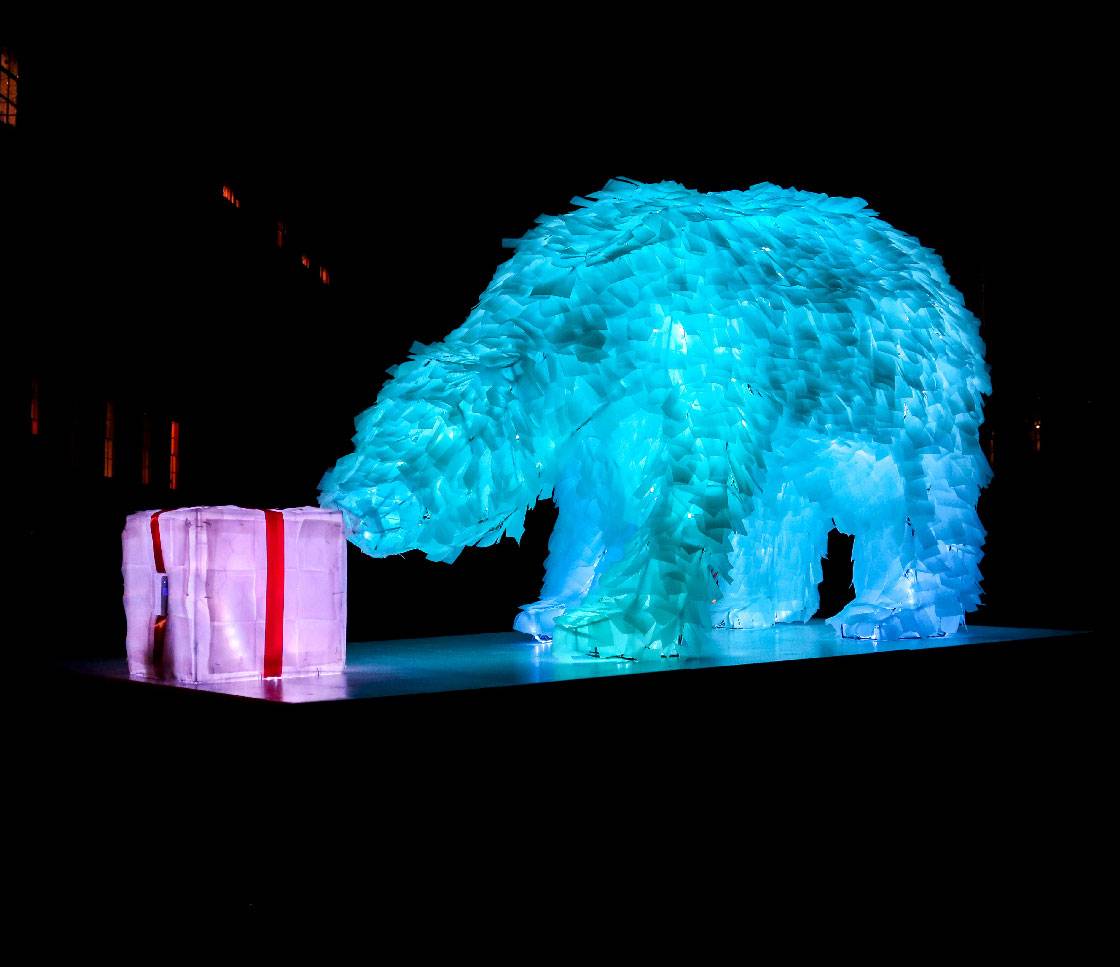
The Students' VR Studios
Bringing the studio thinking practice into virtual reality
The Creative and Cultural Industries Department has been exploring the power of virtual reality as an innovative way to teach creativity. The Students' VR Studios is a pilot test that has been designed for the Year 2 Module "Design Marketing I", using the open source virtual reality platform Mozilla Hubs.
The pilot involved 28 students based in London and the UK, China, Spain, Indonesia, Bulgaria, Hong Kong, Portugal and many other countries.
The two tutors were based in London and Barcelona, and the creative assignment was to design a campaign responding to a D&Ad New Blood Awards Brief and pitch it in virtual reality.
The students' positive feedback and the quality of their work encourages the course to keep experimenting with the possibilities of virtual reality in creative education.
Who teaches this course?
Facilities
You'll use our studio spaces and facilities to experiment and explore new ways to push the boundaries of projects and open discourse across disciplines.
Collaborative and multi-disciplinary teamwork is actively encouraged between students, across faculty courses, international institutions and with industry.
Throughout the course, you'll be encouraged to explore and develop expertise in current design approaches, techniques, media, and application including branding, editorial, interactive design, packaging and 3D design, advertising, information design, digital moving image, sustainable and experiential design.
Skills and techniques such as typography, photography, moving image, printmaking, rapid proto-typing, analysis and research, human factors, presentation, interactive and graphic software all support project work by helping realise solution-led ideas.
Course fees and funding
Additional costs
Depending on the programme of study, there may be extra costs that are not covered by tuition fees which students will need to consider when planning their studies. Tuition fees cover the cost of your teaching, assessment and operating University facilities such as the library, access to shared IT equipment and other support services. Accommodation and living costs are not included in our fees.
Where a course has additional expenses, we make every effort to highlight them. These may include optional field trips, materials (e.g. art, design, engineering), security checks such as DBS, uniforms, specialist clothing or professional memberships.
After you graduate
This degree prepares you for a career in a design agency or similar creative organisation. Once you graduate, you will be ready to apply your commercial expertise to the creative industries, combining your understanding of the values of design and knowledge of commercial practices.
Key information set
The scrolling banner(s) below display some key factual data about this course (including different course combinations or delivery modes of this course where relevant).
Course changes and regulations
The information on this page reflects the currently intended course structure and module details. To improve your student experience and the quality of your degree, we may review and change the material information of this course. Course changes explained.
Programme Specifications for the course are published ahead of each academic year.
Regulations governing this course can be found on our website.
